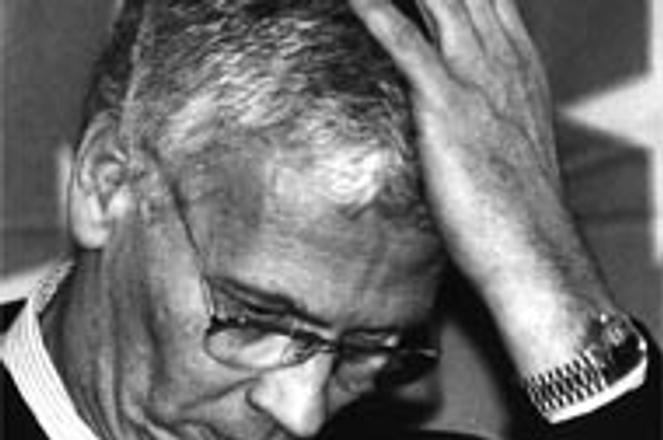Concerned. Hans Van den Broek, EU Commissionar issued a warning to Slovakia to keep history straight in its textbooks.Vladimír Martinka
The European Union (EU) urged Slovakia on June 25 to withdraw a controversial history book defending the Slovak War State's fascist regime and disclaiming the persecution of over 60,000 Slovak Jews during the Second World War.
The EU Commissioner for external relations, Hans Van denBroek, told press in Brussels that he had appealed for the book's withdrawal to Slovakia's new foreign minister, Zdenka Kramplová. "I have asked her to take back this message, that this work should disappear from the shelves as soon as possible," Van den Broek said.
Van den Broek's criticism prompted a swift response, as Premier Vladimír Mečiar announced two days later in Amsterdam that the book indeed will be withdrawn. "This book will not be used in Slovakia as a textbook," Mečiar said, admitting that "parts of the book are incorrect or historically false." Stressing that the book was never approved as a textbook, Mečiar added that it wouldn't be good to liquidate it, but "undoubtedly, it cannot be used in the educational system at all."
Still, Mečiar may encounter opposition to withdrawing the book from his own cabinet and fellow party members. Eva Slavkovská, the Education Minister nominated by the Slovak
National Party, refused to comment on the matter. And five HZDS deputies reacted bitterly toward Van der Broek's comments with a statement of their own. But Mečiar's team lead by Kramplová seemed bent on snuffing out any issues that could further damage Slovakia's image in EU countries. Kramplová spoke in general terms about the political situation. "I underlined that the Slovak government is taking the necessary steps to calm down the political situation in Slovakia and is working for solutions that will be acceptable for everyone," she told reporters.
Kramplová was in Brussels discussing Slovakia's ambitions to join the 15-nation bloc in the upcoming wave of expansion. Ironically enough, the book in question was financed from EU money. EU sources in Bratislava confirmed the book had been financed from the EU PHARE program in good faith and accused the Slovak government of breaking this trust.
"A few days before the program was signed, the Education Ministry asked for financing of three school books and produced expert recommendations from authors in the U.S. and Canada," a Bratislava-based EU official said.
Dušan Kováč, head of the SAV Historical Institute, said one of the reviewers was Stanislav Kirschbaum, son of a former leader of the puppet state's ruling People's Party (HSĽS) who emigrated to Canada at the end of the war. "When the book came out, we were not satisfied and we are having it reviewed by independent experts," the EU official continued. "If their verdict is negative, we shall ask for the money back."
Just don't get it
Van den Broek indicated that the Brussels-based EU officials will go further than merely asking for the money back. "We still have to overcome a number of obstacles, notably in the political domain," Van den Broek said, addressing Slovakia's status in the association process. "There cannot be any misunderstanding about what quality of democracy the EU requires from its own members and from its future members."
However, some government politicians still don't seem to get the Commissioner's warning. Slavkovská, the Education Minister fleeing a cluster of journalists from the Parliament building, said "no comment" when asked to react to Van den Broek's appeal. "We'll see," she reacted to the question of how many more similar books her ministry will ask PHARE to finance. When asked whether she thinks the PHARE funds have been abused, Slavkovská said, "I don't think so."
Meanwhile a group of five HZDS deputies issued a statement condemning Van den Broek's recommendation as "undemocratic rubbish" and "a censor's command".
"We were surprised by the way the EU Commissioner Hans van den Broek spoke of the book of Milan Ďurica," read the statement signed by Peter Brňák, Ján Cuper, Roman Hofbauer, Viliam Hornáček and Ján Smolec. The signatories added that the only thing this censor's command lacks is a postscript that Slavkovská should order to burn the book.
Erasing the past
The book in question, The History of Slovakia and the Slovaks by Milan Ďurica, a Slovak professor at the University of Padova, was published and distributed last fall by the Slovak Education Ministry to all schools as a history handbook. Its reception by schools was mandatory.
Tracing Slovak history from the First Century AD to modern times, the book denies any persecution of Slovakia's 70,000-strong Jewish community under the clero-fascist Slovak State, a Nazi German puppet set up in March 1939.
"[The Slovak government] under [President] Dr Jozef Tiso decided to solve the Jewish question in conformity with Christian moral principles," the book says, adding that conditions in Jewish labor camps were "close to the normal living conditions of the Slovak population".
In the book, Ďurica explains that Vojtech Tuka and Alexander Mach, prime and interior ministers at the time, respectively, were actually humanists who "didn't want Jewish families to be torn apart by send-offs." "Therefore from April 11, 1942," Ďurica wrote, "they began to deport whole families."
Fewer than 10,000 Slovak Jews survived the Holocaust and Slovakia's Jewish community now numbers around 4,000. "The book contains many myths which have been long proved false and factual mistakes," said Kováč of the SAV Historical department. "It can create misunderstanding about what's being thought in Slovakia about the war period and anti-semitism," Van den Broek said.
Reuters contributed to this story.


